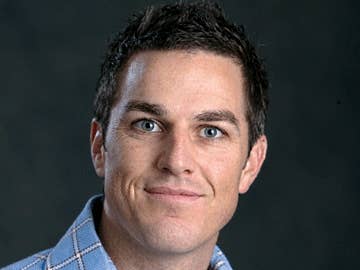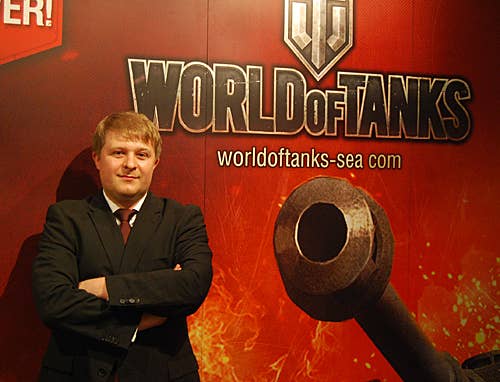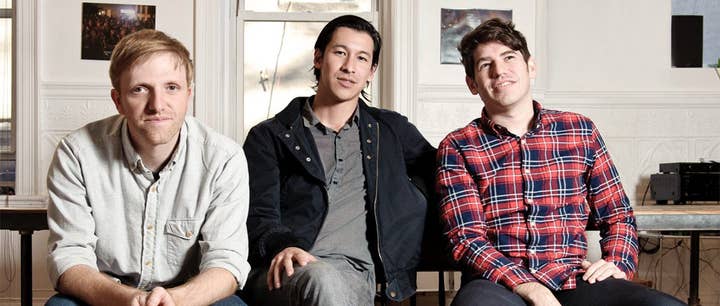Persons of the Year 2012 - Part Two
We now reveal our top five picks - who topped the list?
Yesterday, GamesIndustry International unveiled Part One of its Persons of the Year selection, which offered a look at some notable success stories and failures, including one fictional individual.
Our top five should prove equally interesting, and we hope you agree. Read on to see who we selected as 2012's most important people the games industry.
5. Andrew Wilson, head of EA Sports

There's no handbrake on an ocean liner. The reason to change course may be completely unexpected and distressingly immediate, but such factors make little difference. Turning a vessel of that size takes planning, collaboration and, most importantly, time: you make your plans, and you follow through. There are no doubt more elegant metaphors for EA's current situation than the one laid out here, and it may still be heavily reliant on the success of its physical retail products, but there are already clear signs of the company it intends to be once its vast turning circle is finally complete.
Nowhere is this more apparent than in Andrew Wilson's EA Sports: perhaps the most forward-facing outfit in the traditional AAA industry, seamlessly blending value-packed single-player gaming, dynamic multiplayer modes, social and mobile integration, micro-transactions and even an ongoing dialogue with the actual sports it simulates. If you've been playing FIFA games since the mid-Nineties, tackling challenges based on the previous weekend's fixtures as the commentators blather inanely about Cristiano Ronaldo's real-world woes is an oddly powerful experience. It feels like nothing less than the perfect realisation of what sports games should always have been.
And it hasn't been bad for business, either. Between Madden and FIFA, EA Sports now has two of the year's biggest launches and most consistent sources of revenue, with FIFA, in particular, closing the gap on Call of Duty to the point where it's not unthinkable that the industry could have a new champion in the near future. Under Andrew Wilson's leadership, EA Sports has become less a label and more a year-round service.
4. Anita Sarkeesian, founder of Feminist Frequency

Sarkeesian came to the attention of gamers with a bang that brought out the very worst of the faults inherent in any male-dominated culture. Earlier this year, the Feminist Frequency creator launched a Kickstarter appeal to fund a series of videos investigating the use of stereotypical female gender roles in gaming, hoping to highlight the damage being done to the medium by the imbalance.
While Sarkeesian garnered some support from the offer, attracting the attention of many prominent figures in the industry, she also attracted much less welcome attention from the darker corners of the internet, enduring a torrent of abuse and threats which ran the despicable gamut of anti-semitism, sexism and straight-up violence. Death threats were sent to her personal email, her Kickstarter and Wikipedia pages were defaced and sabotage attempts were made on her projects.
Undeterred, and perhaps even galvanised by the sort of reaction she had elicited with her campaign, Sarkeesian continued a very public pursuit of her funding goals, eventually smashing through her projected total and ending up with a fund of over fifteen times her initial target.
Work on the project continues, but whatever the results, Sarkeesian deserves both recognition and respect for her determination in the face of intense unpleasantness and her willingness to raise an issue which so many in the industry would quite happily ignore.
3. Victor Kislyi, CEO of Wargaming.net

There are lots of reasons to like Victor Kislyi as a journalist. He's honest, he speaks freely because he only answers to his players, and he gives great quotes. And as the CEO of a giant online gaming company, he's still incredibly passionate about the games he helps to make. On the E3 or Gamescom trail, every other interview is with some dead-eyed suit, spilling the pre-written media-briefed lines directly on cue. But you'll find Victor as much excited by the recreation of the French AMX AC tank in-game (it never got past the blueprint stage in real-life) as the uptake of marketing in Asia. And that's a genuine enthusiasm that trickles down through the rest of the company.
Led by Kislyi, Wargaming.net marches to its own beat. Earlier this year it bought its own engine making team in Australia. Kislyi was impatient and didn't want his business waiting in a queue when it came to partners services. Outside of Diablo III and other big online releases, Kislyi knows his real competition is sports events and other time consuming activities in entertainment. It's easy to launch with fanfare and hype, but two to three years down the line you need to be constantly delivering new experiences to your loyal players - otherwise they go off and become loyal to someone else. Under Kislyi, Wargaming is doing that by bringing Tanks and now Planes and Ships across online free-to-play markets. There's a lot of work to do then, but he has the good will of his players and the good business he's built so far backing his ambitions.
2. The Zynga Exec

We could just fill this paragraph with the names of the fallen; all those executives and high-profile games designers who were incredibly excited about the possibilities of joining the fastest growing games business 12 months ago, whether head-hunted or acquired. Those small independent development studios that were so excited about going solo and working autonomously until Mark Pincus knocked on the door with a blank cheque. Those suits at the traditional publishing houses, battered by a shrinking console market and belt-tightening at the top, who saw the brave new world of Facebook gaming and decided to get on board while the tide was rising.
But a year at Zynga seems to be a microcosm of the games business, with rocketing success and staff ramp-up followed by projects shit-canned, layoffs, closures and finally the pivot to an entirely new business. It's been an ugly show, with bruised egos, bloody noses and design documents torn apart. And all the time that share price has been in the public eye, tumbling, ammunition for all those who said Facebook gaming was a fad. Welcome to the games industry, where everything is a fad.
We salute the Zynga executive for trying, but we also fear they never really had a chance to influence anything. Pincus is barreling headfirst into real-money gambling, where there looks to be plenty of money to be made. It makes some in the games business uncomfortable, that association with gambling and all the stigma it brings with it. But when your business is first and foremost about making cash, it's going to attract people who are only ever going to be in it for the money. We're not giving up on Zynga, and we've all got to pay the bills, but let's see how the shift works out for the Zynga exec. Hang on to your wallet and update your LinkedIn account, because we should know within three months whether it was a good idea or not...
1. Kickstarter co-founders

GamesIndustry International's top Persons of the Year award goes not to one individual, but to three: Kickstarter co-founders Charles Adler, Perry Chen, and Yancey Stickler (pictured from left to right).
With the console cycle dragging on far longer than usual and more and more publishers becoming risk averse to new projects, many developers sought out other avenues to bring their games to fruition. With the rise of digital publishing on the PC, mobile and tablets, there are perhaps more opportunities for game designers than ever before. And thanks to Stickler, Adler and Chen, Kickstarter afforded many developers the chance to realize their projects without the need to convince a suit at a major publisher that their title is worth supporting.
Ever since February, when Tim Schafer's Double Fine Adventure project blew up on Kickstarter (setting a record at the time of $3.3 million), the popular crowdfunding platform has been on the lips of just about everyone in the industry. It created an avalanche of projects and a sea of emails for journalists to wade through each morning - to the point where many press had to ignore numerous pitches. Kickstarter fatigue was beginning to become a problem, as so many developers attempted to dig for gold from the generous pockets of a gaming audience eager to get involved.
Despite the gold rush, the beauty of Kickstarter is its community focus. The gaming community has been voting with its collective wallet to decide which projects get greenlit and which fade into obscurity, and backers get rewarded for their support not only with physical items but the gratification that they've helped shape a game during its design phase. Kickstarter empowers developers and gamers alike and gives players a direct line of communication with those building the game unlike any ecosystem before it. Much like the CEO of a big publisher is beholden to the company's shareholders, a developer on Kickstarter must address the feedback of supporters throughout the course of a project.
"2012 was the Year of the Game on Kickstarter... We're honored to just be part of it"
Yancey Stickler
It's a task that some developers are unprepared to handle, but it's one that, if handled correctly, can be leveraged to the developer's advantage. By constantly addressing questions and asking questions of a community around a project, a developer is able to essentially transform a fervent crowd into viral marketers for a game. Any feedback from the community can also be utilized to directly alter a design in progress so that it better fits the desires of the audience.
While we're unlikely to ever see a game on the scale of Call of Duty get funded on Kickstarter - that would be just too many tens of millions of dollars to be realistic - what's so appealing about the platform is how it's bolstered the dying (dead?) AA marketplace. The games that EA, Activision or Ubisoft would never give a chance now have one, so long as gamers are willing to give it a look. As Obsidian's Chris Avellone commented to us, “We're doing the type of games that they generally don't do. We're not even really competing per se.”
Kickstarter's influence on the games industry has been remarkable. Games have seen nearly $83 million pledged and are second only to Film & Video in terms of categories for all dollars pledged so far. Furthermore, 2012 has really seen games rise to the forefront, as the Games category has $4.33 million pledged to live projects at the moment. That's more than any other category and $1.2 million more than the category with the second most, Design.
While 2012 has clearly been the year of Kickstarter, the reality is no one knows what the long-term implications of the crowdfunding site will be. “I feel like Kickstarter is still in its infancy when it comes to the process; I feel like we're in the honeymoon phase,” noted Avellone.
Kickstarter has given many in the industry a fighting chance. Let's hope that honeymoon blossoms into a lasting marriage.
Upon receiving our Persons of the Year award, Yancey Stickler, Head of Community and co-founder, remarked, "2012 was the Year of the Game on Kickstarter. The explosion of creativity that the gaming community has brought to Kickstarter in 2012 has been an inspiration. We're honored to just be part of it."

